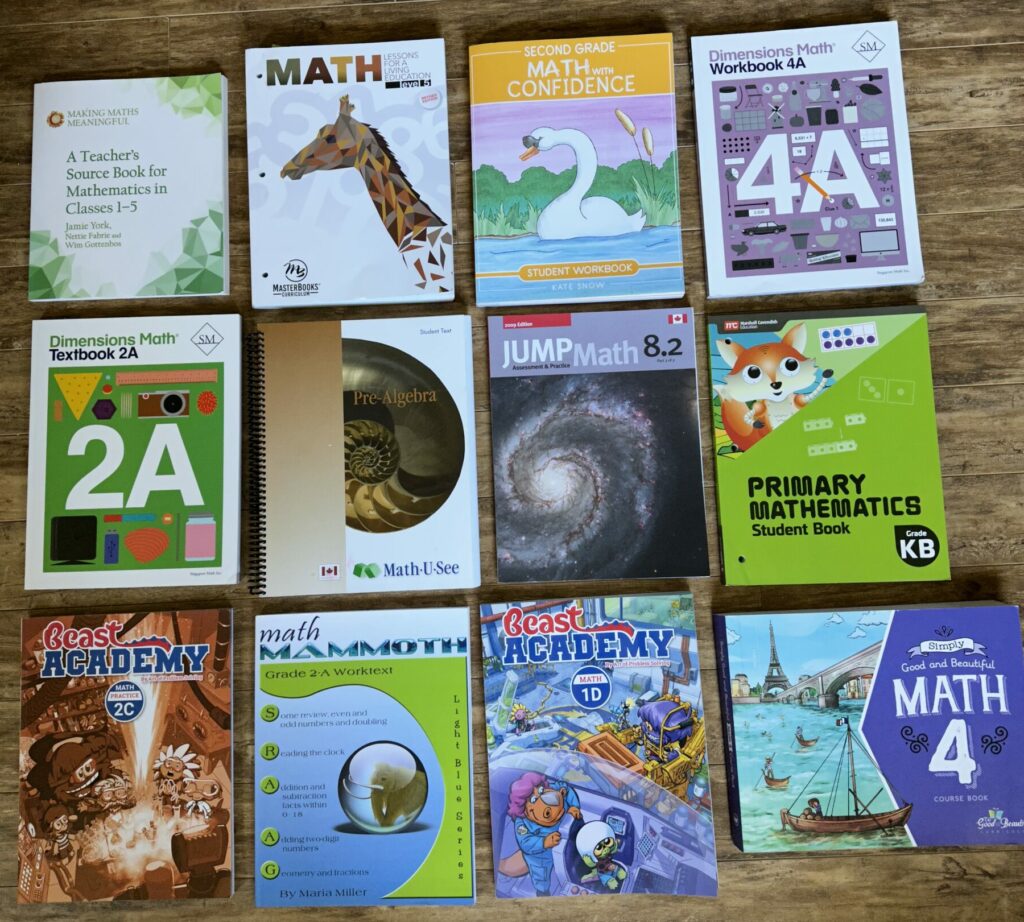 Are you trying to choose the best homeschool math curriculum for your family?
Are you trying to choose the best homeschool math curriculum for your family?
You’re not alone.
In fact it’s the question that many seasoned homeschoolers get asked the most, what math curriculum has worked for you?
Now to answer this question I will share my biggest mistakes from trying out different ones.
The ones we’ve tried (over a 9 year period) are
- Math Mammoth
- Singapore Primary (old and new)
- Dimensions Math
- Math Lessons for a Living Education
- Simply Good & the Beautiful Math
- Beast Academy (online and workbooks)
- Jump Math
- Teaching Textbooks
- Critical Thinking Company Mathematical Reasoning
- Math with Confidence
- Waldorf Math (using various teacher guides)
- Math U See
That’s a lot right?
Let me tell you it’s been a goldilocks journey.
There were some big mistakes I made that I wish I’d known.
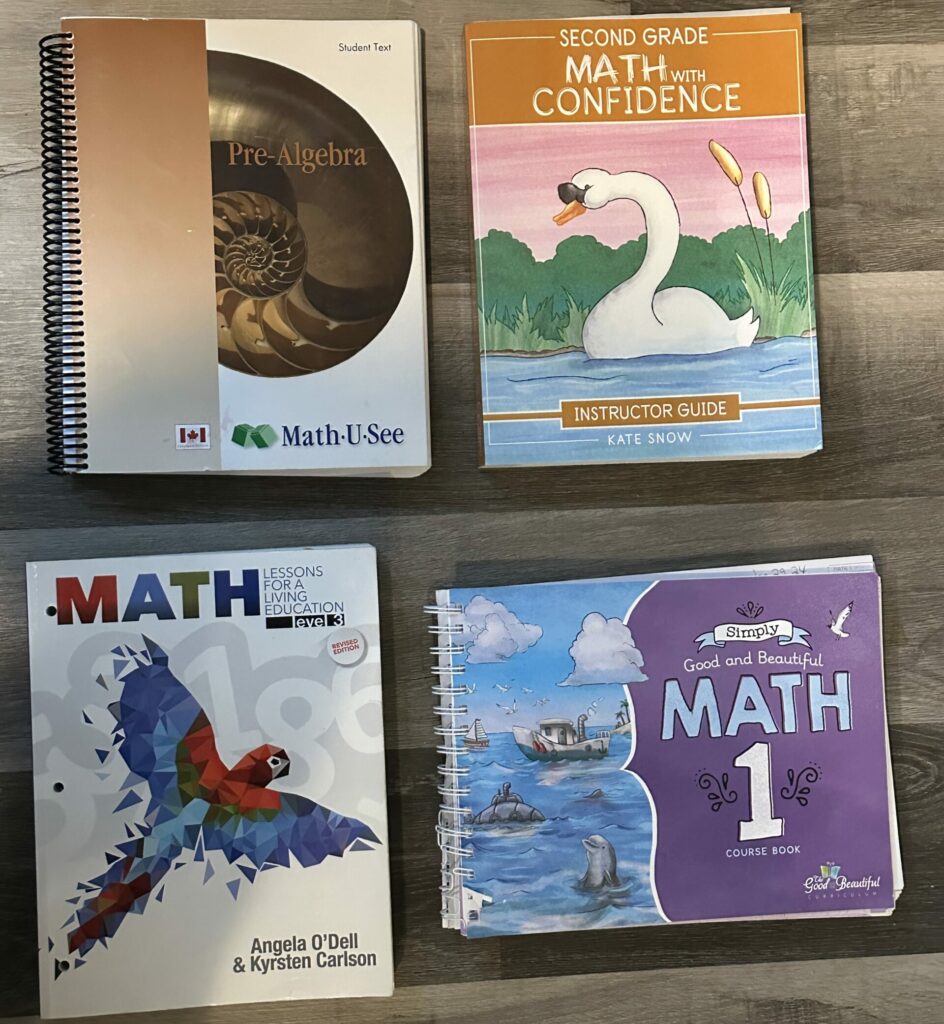
I want to help you avoid these and choose the right math curriculum for your family.
I have 4 kids and each of them learn math differently. It took me a few years to gain confidence in teaching math once we got to older grades, and for some of those years I had babies and toddlers in tow.
Currently I have a grade 1 gifted math student, 2 kids with ADHD (shorter attention spans) and one that struggles with mental math concepts. I feel like I have a well rounded experience to help you with yours!
How to choose a math curriculum- What I did wrong so you can avoid these big mistakes
This post covers
- Important questions to ask about your learner and family
- Tips for how to choose your math curriculum
- What math we’re currently using for our family
Important questions to ask before you choose a math curriculum
Does my child need mastery or spiral learning?
Some kids need to master a skill and focus on one concept at a time. This will be boring however for a kid who gets a concept right away. The spiral approach teaches some concepts then continues to build on those skills each year. It might take you awhile (or years) to figure out how they learn best.
-
- Take a placement test- with math you HAVE to go at their level NOT the grade they are in. It’s beyond important to get the foundations of math to have success as they grow older. If you have an older student that struggles with math it can help to choose one that doesn’t have the grade on the front.
What is your comfort level teaching math?
Do you need video lessons to teach math? You might be comfortable or even have fears of math from your own childhood (seriously, they don’t show up until you’re back in the thick of it!). For me it went smoothly until fractions and decimals then I tried some video lessons because I’d forgotten some concepts (I will also admit, I had to re-learn long division).
Whether you work from home, have many kids or just feel better about someone else teaching math lessons with videos this can be a great choice.
Does your child tear up when the math books come out?
I’ve had this happen with a couple of our kids and gently tried to keep going the next day (we always pause if tears are happening). Some math programs are ‘lighter’ than others. Don’t choose an advanced curriculum for the kids that tear up.
This might also be a situation where the child needs a mastery program vs a spiral one because they feel frustrated as they’ve forgotten some concepts from the previous months or years. I’ve seen some spiral math that only offer 2 pages per concept and then bounce around, others offer pages upon pages of practice so that it’s more ingrained.
Usually when a kid tears up in math they want to understand something and feel frustrated that they can’t.
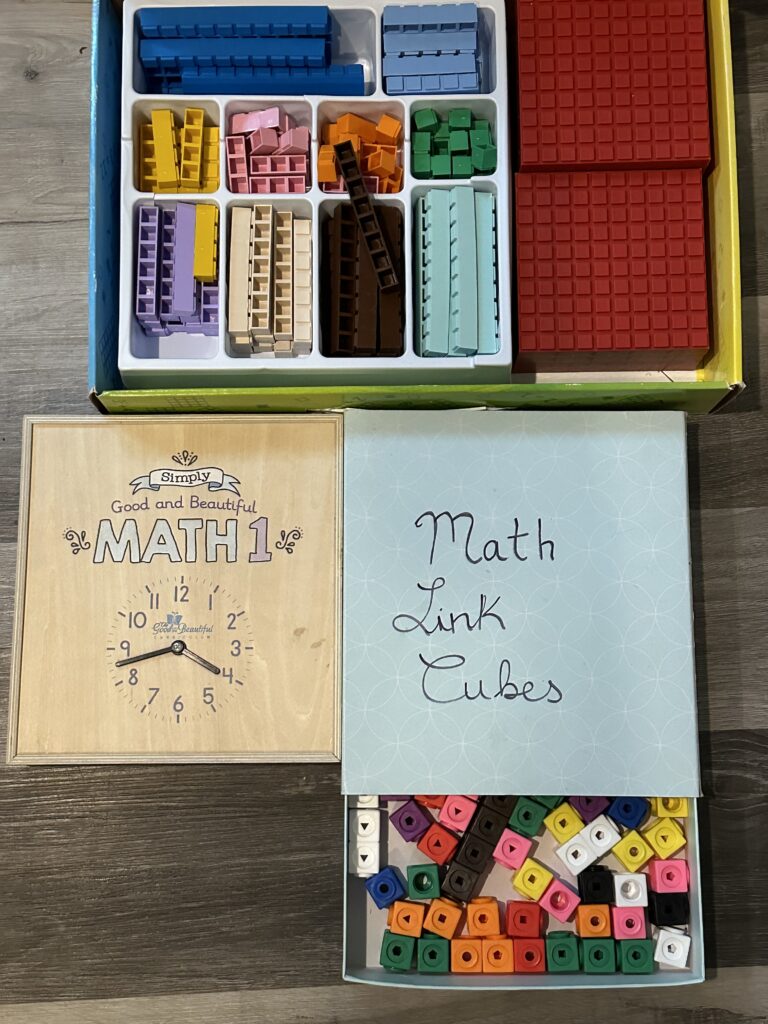
Math manipulatives can help kids that need to ‘see’ math but they can also be a distraction
That causes emotions and tears which builds to a dislike (or hate) of math.
I’ve kids that hated math that have now moved on to not love it, but to do it without the tears or frustration (I’ll talk more about that later).
I also believe that sometimes you might need another person to explain a process or concept to the child for them to understand it better (that could be video lessons or a tutor). Maybe this child needs the hand on manipulatives to SEE the math happening.
You want math to be a positive experience so this one will take more trouble shooting and time to find the right fit. Don’t give up on a curriculum right away, however you might need to change it if it’s truly not explaining things the way the student learns.
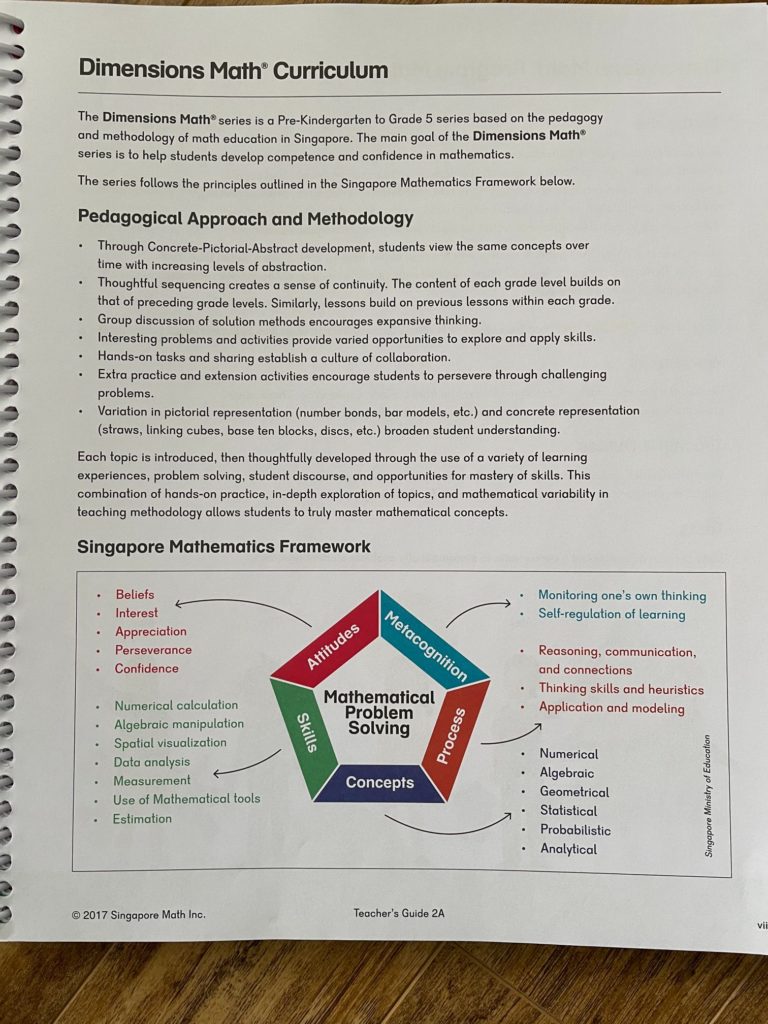
- Never look at the level and assume it’s grade level. Some math curricula are advanced, others aren’t. While the advanced math students benefit from those programs don’t assume level 4 is grade 4. Take a placement test!
Do you need open & go?
An open and go curriculum is exactly that, you don’t need to do any prep work, you can just start the lesson. Others offer very informative teacher guides to teach the lesson, however, it requires far more time on your end to implement. These are fantastic and often offer deeper instruction, but you may not have the time for them.
Is your child gifted in math?
I kept hearing that I shouldn’t do more than one math curriculum a year, that’s overkill! But I have one child that takes forever to do 1-2 pages and another that does 8 in one sitting and sometimes still wants more. There are some curriculum geared towards those mathy kids because they think mathematically, love patterns and problem solving.
If your child is gifted or loves math feel free to add more or find a more advanced curriculum and go above their grade level.
Our kindergartener knew all the answers of addition/subtraction to 10 and level K was beyond boring for him yet he couldn’t write. We moved onto grade 1 math, yet I had to transcribe or get him to verbally answer the questions because of his limitations in hand skills. I didn’t let that stop him from advancing his math and now that his hand dexterity is better he continued the workbook in his handwriting.
Does your child need a lot of white space?
Some kids feel really overwhelmed when pages are far too busy. I’ve seen some programs where the pages are full to the max in tiny font with limited space to even write the answer. Some are beautiful but have so many irrelevant images or too much to look at that it distracts from the math problem.
White space, and less problems per page, can help make a child (especially if this subject is a struggle) feel more comfortable.
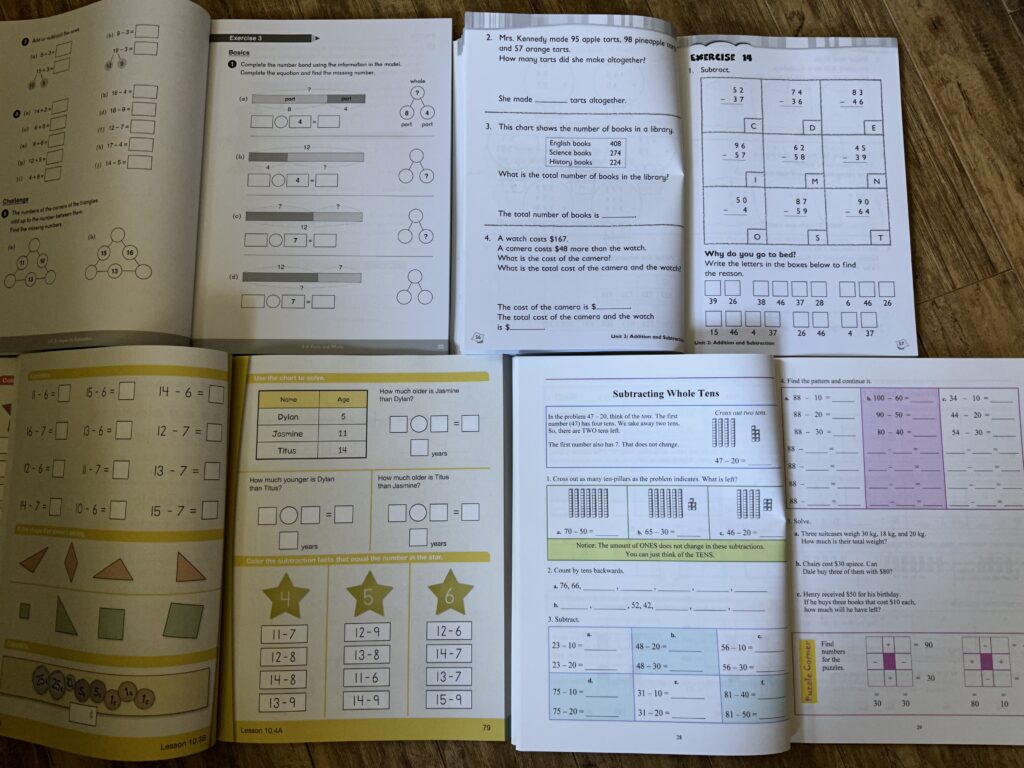
Do you have a younger child that struggles writing numbers?
Some of our kids learned to write numbers quickly, our little guy (who is gifted verbally in math) really struggled to answer the questions in tiny spaces until recently. I’ve seen such variance in the younger workbooks for the size and space for answering questions.
How hands on do you wish to be?
There are some math curricula that offer short lessons, others offer manipulatives. Some you have to read a lengthy teacher guide and play all sorts of games.
Do you have babies? Limited time as you work part-time? The time you want to spend on math (or your child’s attention span!) will all be a factor.
How much money do you have to spend?
Curriculum can vary in cost by $20-$300!! How much money you can afford makes a difference with choice. I have managed to find an expensive curriculum at a discount second hand, so looking at homeschool swaps or sales helps.
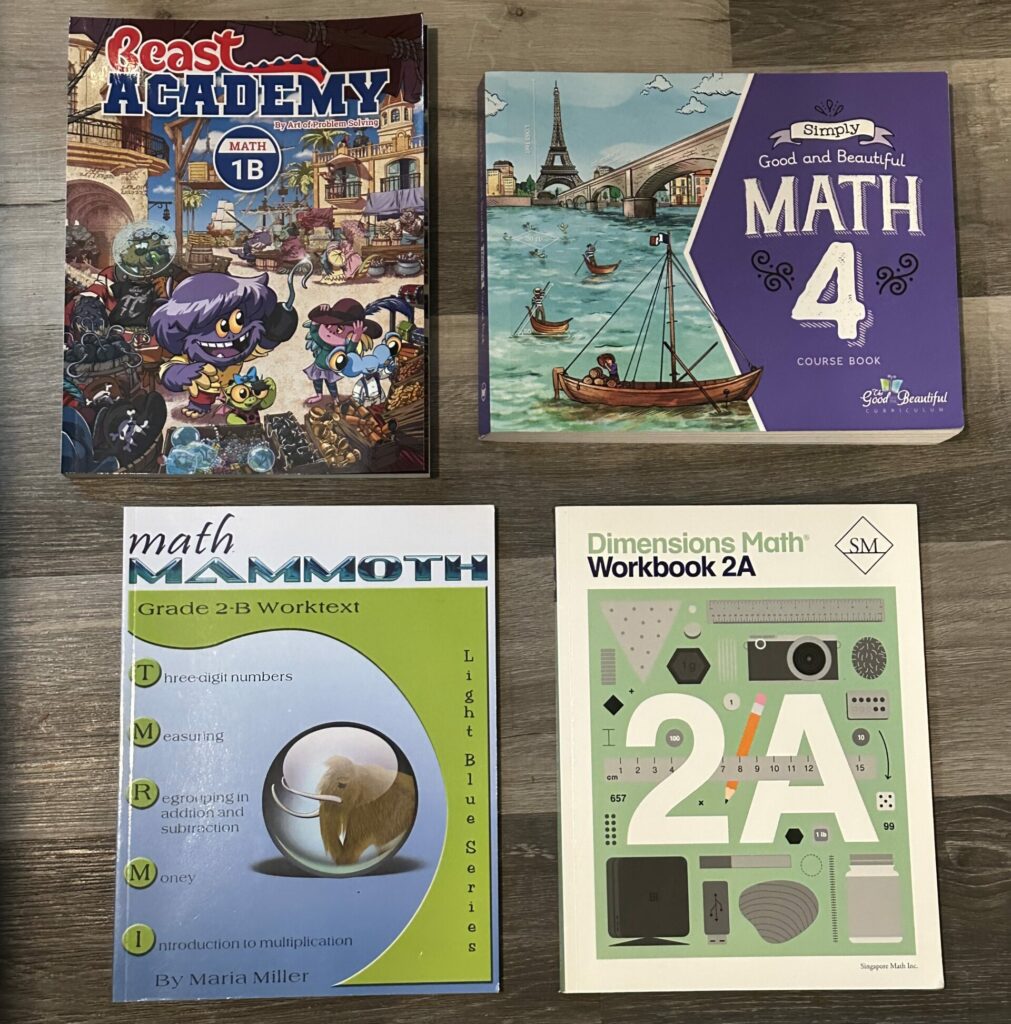
How to choose a math curriculum that works for your family
-
- Look at the samples first. All math companies will offer samples of the teacher guide and the student workbook online on their websites. Some of you will have the privilege of going to a convention where you can look through the curriculum too.
- Make a list of what you’re looking for so it can help check the boxes. Create a list of your limitations too (for example toddlers!).
- Try a sample video lesson or print the sample sheets. Ask your kid if they like the looks of it or how they liked the teacher.
- See if you can find it second hand so you don’t spend as much finding the right program. Sell programs that didn’t work out, or keep for younger siblings! I have a few I’ve kept for that reason.
- When switching, be careful of where to start. Some math curricula are split up into multiple workbooks a year. This can be very helpful if you need to start on workbook 1 or 2 (or a or b) that way you aren’t starting at the beginning of an entire curriculum. Always take a placement test for where your child is at, not what their grade level is.
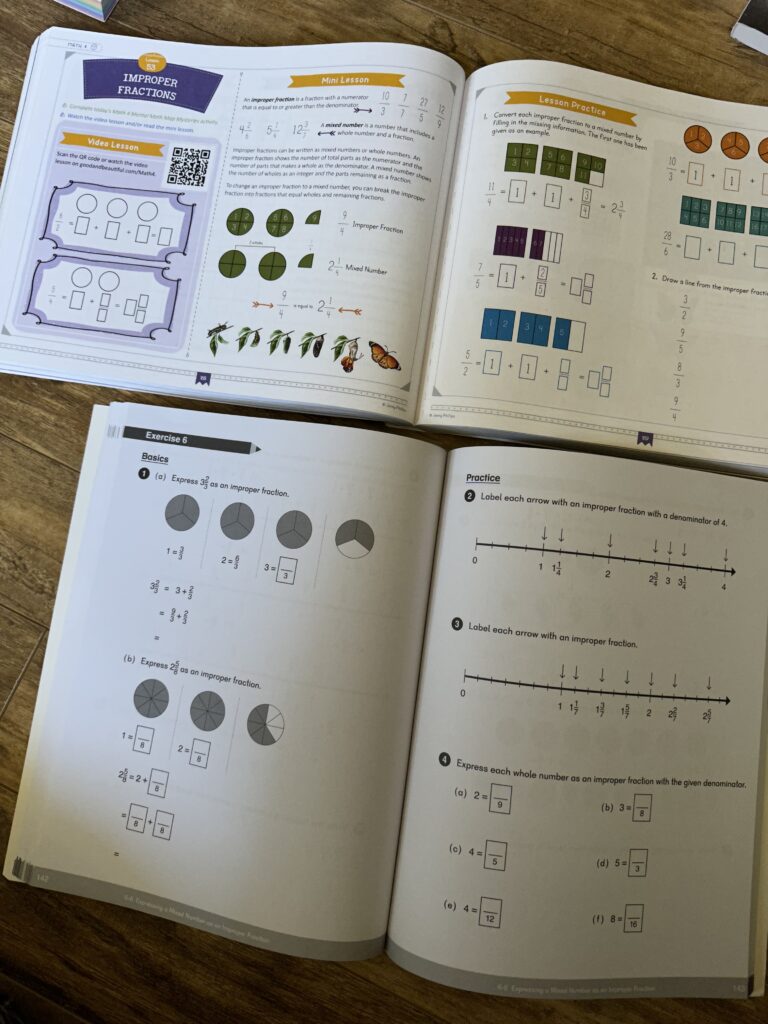
What we’re currently using for our kids math curriculum
Three of our kids are not ‘mathy’ and need shorter lessons because of attention spans. This aligns with our Charlotte Mason inspired homeschooling. I was trying to avoid video lessons for that reason but for our oldest they’ve been a recent blessing.
- Our grade 8 just switched to Math U See pre-algebra. Previously we’d tried many but this hands on mastery based curriculum with videos is what she needed to get over the recent math tears. It’s been amazing to see her actually wanting to do math. I sit with her for the videos and I’m on standby if she needs it until she becomes more independent. She enjoyed beast academy online previously and tried TGTB but levels aren’t her grade level anymore.
- Grade 6 struggles a lot with mental math. She’s been doing Math Lessons for a Living Education (light on math). I tried switching her to The Good and the Beautiful last year but she personally felt too overwhelmed with the pages being so full. She also struggled with dimensions and Singapore because it had so much conceptual mental math. I think I might switch her to Math U See next year as MLLE only goes to level 6.
- Grade 2 is doing Second Grade Math with Confidence. She enjoys larger spaces to write numbers and the mastery approach. We’re moving along very slowly and it takes her a long time to do one page.
- Grade 1 is our little math guy! He’s doing Beast Academy 1 workbooks and First Grade Math with Confidence. We play A LOT of board games, cards etc with this guy too as he loves it. I will likely stick with Beast Academy for him and add in the Math Mammoth that didn’t work for his sisters.
Just because the above curriculum works for our family doesn’t mean it will work for yours.
Our grade 8 did Singapore math successfully because she was great at mental math until level 3 then we made a switch. Check in yearly, or even a few times a year, to make sure it’s all going well.
Also remember most kids will still yawn at being asked to do math.
Help them realize the benefit of math in the real world. Measuring + decimals = building houses. Fractions in the kitchen, learn about jobs that require math like engineering, space exploration learn about the golden ratio in art and nature.
Board games are excellent for instilling math memory and better retention of math facts. There are some fun educational books like Sir Cumference series.
I really hope this blog post helped you choose the best math curriculum for your family
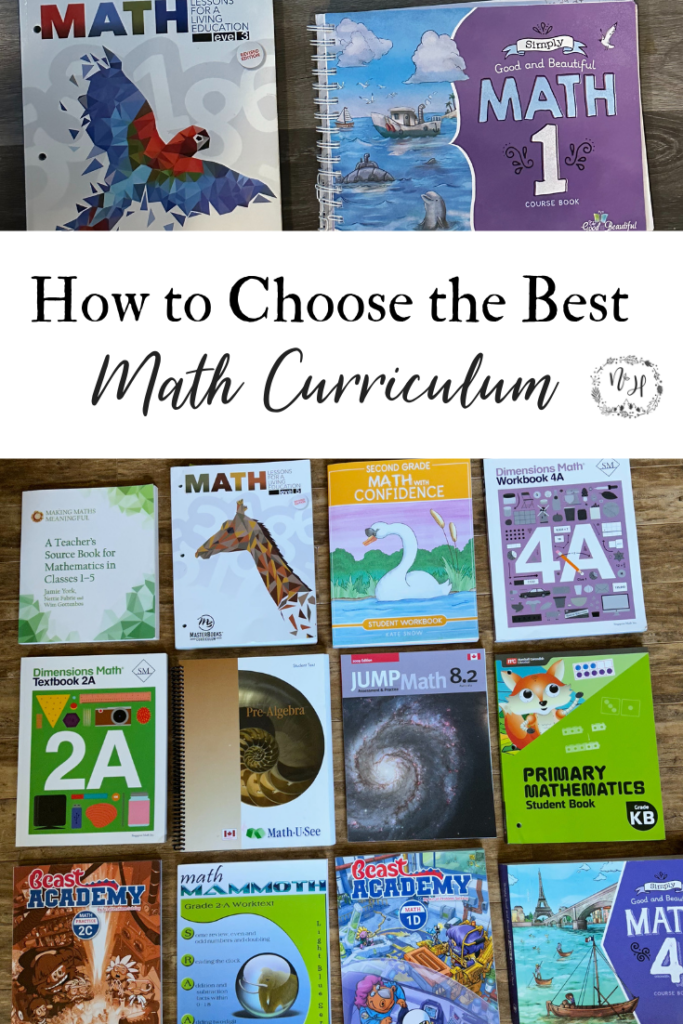
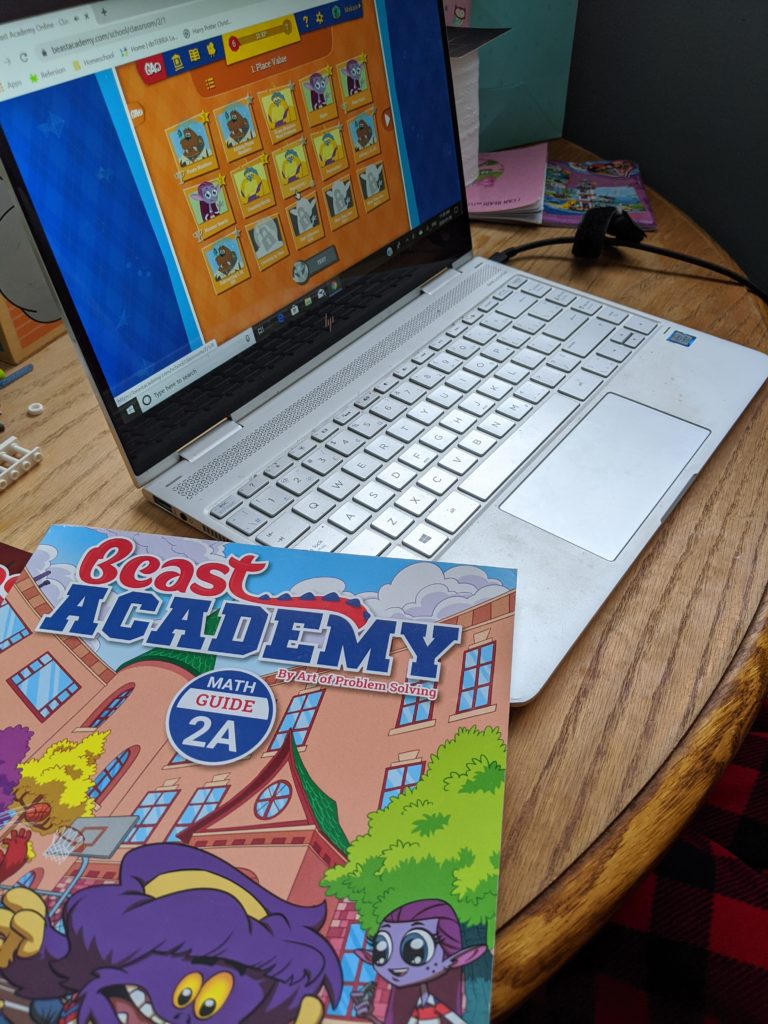



Leave a Reply